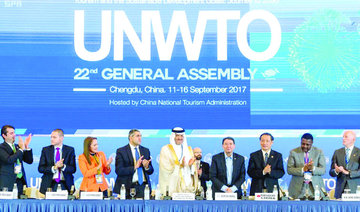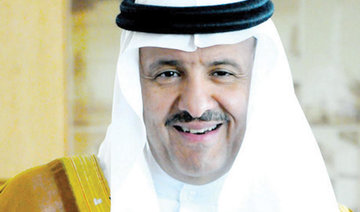JEDDAH: The Saudi Commission for Tourism and National Heritage (SCTH) has been pushing businesspeople to invest in medical tourism that can boost the local tourism sector.
The SCTH has established a number of facilities around the places where geothermal waters flow, with the aim of attracting investors to establish spas in more than five areas in the Kingdom.
The SCTH’s deputy president for programs and products, Abdullah Al-Murshid, told Arab News that the historical Ain Najm in Al-Ahsa is one of the most prominent touristic sites in the Kingdom.
“With its hot sulfuric water, It has long been a tourist attraction,” he said. For a long time it has been known as a place where pilgrims can gather before heading to Makkah.
As part of its plan to pave the way for investment in touristic sites, the SCTH established public facilities around the geothermal waters of Al-Dobdobah well in the Khasara area in the Eastern Province, about 50km from Hafr Al-Battin on the way to Kuwait.
“It is an artesian well that was dug 30 years ago and its sulfur-containing water flows from a depth of 2,710 meters. Its temperature is 65C and it can be made cooler by adding normal water. Some people want to use mineral water to treat rheumatism and skin diseases,” Al-Murshid said.
With 69C water, Wadi Al-Khalab hot water springs, 137m above sea level, are even hotter. The spring is some 70km southeast of Jazan province. “We have prepared the site to provide a therapeutic recreational resort that can attract tourists seeking treatment,” he added.
Some 40km south of Al-Qunfodha city in Makkah province, Ghumaiga village is known for its hot springs.
Many patients with skin-related illnesses travel to the village from across the Kingdom to benefit from the therapeutic features of its water.
There are also famous hot springs in the village of Tharban, some 100km south of Al-Mikhwah.
The water from these springs is chemically similar to those in the US, Japan, Russia, Turkey, New Zealand and East Africa.
“Patients usually associate hot springs and mud from the Dead Sea with the treatment of psoriasis. They believe these things can be a remedy for their skin problems,” Marwa Ibrahim, a specialist dermatologist, told Arab News.
The dermatologist said hot springs and Dead Sea mud are rich in minerals, salts and other materials. “These ingredients can make skin patients feel they have improved, but these have not yet been scientifically proven to be a remedy,” Ibrahim said.
Saudi Commission for Tourism and National Heritage uses hot springs to boost investment in medical tourism
Saudi Commission for Tourism and National Heritage uses hot springs to boost investment in medical tourism

Saudi FM arrives in Cairo to chair meeting of Ministerial Committee on Gaza

- Meeting will also be attended by EU foreign policy chief Kaya Kallas
CAIRO: Saudi Arabia's foreign minister Prince Faisal bin Farhan arrived in Cairo on Sunday to chair a meeting of the Ministerial Committee on Gaza.
The meeting has been assigned by the Extraordinary Joint Arab and Islamic Summit on developments in the Gaza Strip, the Saudi Press Agency reported.
It will also be attended by Kaya Kallas, High Representative of the European Union for Foreign Affairs and Security Policy and Vice-President of the European Commission, to discuss the latest developments in the enclave amid the Israel-Hamas conflict.
KSrelief provides aid to Syria, Sudan, Lebanon

RIYADH: Saudi aid agency KSrelief has delivered thousands of food packages to some of the world’s most vulnerable people, the Saudi Press Agency reported on Sunday.
KSrelief distributed 143 packages to families in need in Qatana city in Rif Dimashq governorate — as part of the Etaam Ramadan Food Basket Project — in the Syrian Arab Republic.
KSrelief also provided 259 food baskets to families in Shinshar village in the Homs governorate, benefiting 974 individuals.
The Etaam project, which is now in its fourth phase, aims to distribute more than 390,000 food parcels in 27 countries during Ramadan, benefiting 2.3 million people at a cost of more than SR67 million ($17.8 million).
In addition, some 430 food packages were distributed in Port Sudan, benefiting 2,395 needy and displaced people in that country.
KSrelief also distributed 800 shopping vouchers and 500 food baskets in Akkar governorate, northern Lebanon, helping 3,300 individuals.
Saudi project restores historic Al-Hosn Al-Asfal Mosque in Asir

- The second phase of the Prince Mohammed bin Salman Project for the Development of Historic Mosques aims to protect Islamic heritage
RIYADH: The historic Al-Hosn Al-Asfal Mosque in the Asir region has been restored as part of a national project, the Saudi Press Agency reported.
The second phase of the Prince Mohammed bin Salman Project for the Development of Historic Mosques aims to protect Islamic heritage and highlight traditional architectural styles.
Built in 1760, Al-Hosn Al-Asfal Mosque was renovated to preserve its original design and geometric shape while restoring its sustainable features.
These include a rainwater collection system that stores water in the mosque’s reservoir and is used for ablutions, the SPA reported.
The mosque, designed in the Sarat style, covers 134 sq. meters and can accommodate up to 32 worshippers.
A notable feature is the Al-Manzala room, traditionally used to host travelers. Its construction features stone walls, which reflect the upper mountain villages’ urban fabric.
Adorned with white plaster, the mosque stands out from neighboring buildings. The Sarat style’s urban patterns are influenced by climate, topography and culture.
It is one of 30 mosques in 13 regions in phase two, including six in Riyadh, five in Makkah, four in Madinah, three in Asir, and two each in the Eastern Province, Jouf, and Jazan. The Northern Borders, Tabuk, Baha, Najran, Hail and Qassim each have one mosque in the scheme.
Phase two follows phase one, completed in 2018, which restored 30 mosques in 10 regions. Saudi companies and heritage restoration experts are leading the development efforts, according to the SPA.
Saudi charity drives support for mosque projects, Umrah trips and Zakat Al-Fitr

RIYADH: The fifth National Campaign for Charitable Work, hosted on the Ehsan platform during Ramadan, continues to attract significant donations, focusing on mosque enhancements and worship services.
The campaign has funded more than 3,000 Umrah trips, built five mosques, maintained 46, and provided essential resources to 12, the Saudi Press Agency reported on Sunday.
Donations can be made via ehsan.sa or the donor service center at 8001247000, the SPA added.
Ehsan has also begun accepting Zakat Al-Fitr donations digitally to ensure prompt distribution to eligible recipients across the Kingdom.
This follows the approved charitable methods of Ehsan’s Shariah Committee, chaired by Royal Court Adviser Sheikh Abdullah Al-Mutlaq, a member of the Council of Senior Scholars.
Donors can pay Zakat Al-Fitr via the Ehsan app or website, specifying the administrative region and the number of recipients. This is done in coordination with relevant authorities across all regions.
As part of the fifth National Campaign for Charitable Work, Zakat Al-Fitr distribution aims to empower the community during this season of giving and fulfill religious obligations, according to the SPA.
Supporting charitable initiatives, King Salman donated SR40 million ($10.6 million), while Crown Prince Mohammed bin Salman contributed SR30 million for the fifth campaign. So far, total donations have exceeded SR1 billion.
This achievement reflects Saudi society’s commitment to unity, solidarity, and compassion during Ramadan. Contributions have come from individuals, companies, institutions, and philanthropists.
The 2024 campaign has raised more than SR1.8 billion through 15 million transactions, reinforcing the Kingdom’s leadership in charitable work and sustainable development.
Saudi project clears 552 Houthi mines in Yemen

RIYADH: Members of Saudi Arabia’s Project Masam removed 552 explosive devices from various regions of Yemen last week.
The total included 513 unexploded ordnances, 35 anti-tank mines and four explosive devices, according to a recent report.
Ousama Al-Gosaibi, the initiative’s managing director, said a total of 485,501 mines had been cleared since its inception in 2018.
The explosives were planted indiscriminately and posed a threat to civilians, including children, women and the elderly.
The demining operations took place in Marib, Aden, Jouf, Shabwa, Taiz, Hodeidah, Lahij, Sanaa, Al-Bayda, Al-Dhale and Saada.
The initiative trains local demining engineers and provides them with modern equipment. It also offers support to Yemenis injured by the devices.
Teams are tasked with clearing villages, roads and schools to facilitate safe movement for civilians and the delivery of humanitarian aid.





















